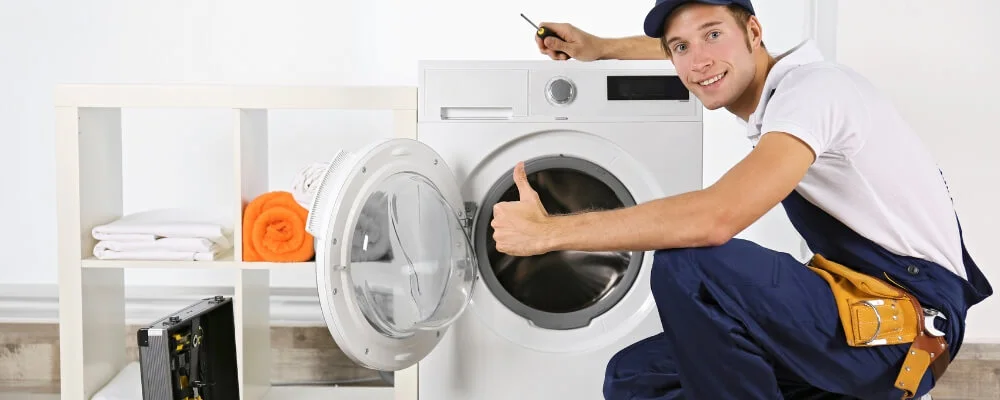In the modern home, a washing machine is no longer a luxury but a staple, tirelessly working behind closed doors to keep our clothes fresh and clean. Yet, like all household appliances, it comes with safety considerations. While most of us might believe we’re using it correctly, hidden dangers and precautions often go overlooked.
Whether you’re a first-time homeowner or have been doing laundry for decades, being informed and proactive is essential. In this blog, we’re diving deep into the top 10 washing machine safety tips that everyone needs to know. From the basics of installation to the nuances of maintenance, let’s ensure every laundry day is effective and safe.
Essential Washing Machine Safety Tips You Need to Know
Operating a washing machine safely ensures not only the longevity of the appliance but also the safety of those using it. Here are 10 washing machine safety tips you need to know:
1. Read the Manual
Before washing your clothes, it’s imperative to read the manufacturer’s manual that comes with your washing machine. This document isn’t just about the machine’s features or warranty information. It’s a comprehensive guide on how the appliance is designed to operate safely and efficiently.
By understanding its contents, users not only acquaint themselves with the machine’s safety features but also with the do’s and don’ts, which can prevent potential mishaps and prolong the life of the device.
2. Check Pockets
We’ve all heard the clanging sound of a forgotten coin in the drum or faced the horror of a pen leaking all over a laundry load. These are not just minor inconveniences but potential hazards. Items left in pockets can become lodged in the machine’s drain or between the drum and the door seal.
Moreover, hard objects like coins or metal pieces can damage the inner drum or become projectiles during the spin cycle, leading to potential harm or machine damage. Ensuring that pockets are empty safeguards both your clothes and your machine.
3. Avoid Overloading
The temptation to stuff just one more garment into the washing machine to save time can lead to many problems. Overloading prevents clothes from moving freely, reducing the washing efficiency as detergent and water can’t circulate properly.
Moreover, the extra weight and volume can strain the machine’s motor and the drum’s bearings. This wears out these components faster and might result in malfunctions or complete breakdowns. Adhering to the manufacturer’s load capacity recommendations ensures that the machine operates within its designed limits.

4. Use the Right Detergent
The market has many detergent types, each formulated for specific washing machine types and conditions. Using the wrong type, especially in high-efficiency washers, can produce excessive suds. This over-sudsing phenomenon makes the machine work harder to rinse clothes, leading to longer cycle times.
Furthermore, the extra suds can leave a residue on clothes and the machine’s inner components, reducing cleaning efficiency and potentially causing build-ups that affect performance. Always match the detergent type with your machine’s specifications.
5. Keep the Area Dry
The space where your washing machine sits should be dry and clean. Wet floors can be a slipping hazard, especially when moving wet laundry in and out of the machine. Consistent moisture around the washing machine can hasten oxidation, leading to rusting.
When exposed to moisture, electrical components can malfunction or, worse, pose an electrocution risk. Regularly checking the area for any water leaks, spills, or condensation and keeping it dry ensures a safer laundry environment.
6. Keep the Door Closed
Leaving a washing machine’s door or lid open when not used might seem harmless, but it can have significant consequences. First, there’s the safety concern for children and pets. The drum’s space can appear inviting, leading to dangerous situations where they might become trapped.
Additionally, an open door provides an ideal environment for mold and mildew to flourish due to the remaining moisture post-wash. Over time, this growth can produce an unpleasant odor, degrade the machine’s internal components, and affect the cleanliness of subsequent washes. By simply keeping the door closed, you maintain a safer environment and prolong the life and efficiency of your machine.
7. Monitor Water Hoses
The water supply hoses ensure your washing machine operates without hitches. However, like any other component, these hoses undergo wear and tear. They can develop cracks, bulges, or other signs of deterioration, especially at connection points.
Neglecting these signs might result in a burst hose, and given the volume of water a washing machine uses, this can lead to significant flooding in your home. Regular inspections of these hoses and proactive replacements can save you from potential property damage and hefty repair bills.
8. Child and Pet Safety
With their buttons, dials, and moving parts, washing machines can appear fascinating to children and pets. Yet, they are not toys. Beyond the obvious danger of a child or pet getting trapped inside, there are risks of them tampering with the settings or inadvertently starting a cycle.
To prevent accidents, it’s essential to always supervise younger family members and pets in the laundry area. For added safety, consider installing child locks or barriers ensuring that the washing machine remains off-limits unless an adult is present.

9. Plug into a Grounded Outlet
Electrical safety should never be taken lightly, especially with appliances as significant as washing machines. Ensuring your machine is plugged into a grounded outlet provides an essential safety mechanism.
Grounding helps protect users from potential electrical shocks, particularly if there’s a malfunction. If you observe any signs of irregular power delivery, such as flickering lights when the machine operates or unexpected power interruptions, it’s a signal to consult an electrician. Such signs might indicate underlying electrical issues that need addressing.
10. Maintenance and Repair
Like any significant appliance, washing machines require regular check-ups to maintain optimal performance. Over time, components can loosen, wear out, or malfunction. Keeping a keen ear for unusual noises or vibrations can provide early warnings of potential issues.
Instead of waiting for a complete breakdown or attempting DIY fixes, which might exacerbate the problem, consulting a professional ensures the machine gets the expert care it needs. Regular maintenance not only prolongs the life of your machine but also guarantees that it operates efficiently, providing clean laundry with every cycle.
Conclusion
Though often taken for granted, washing machines play a pivotal role in our daily routines, ensuring that we’re greeted with clean clothes whenever we need them. However, their seamless operation requires more than just a button press. Safety and efficiency go hand-in-hand, and by understanding and implementing the 10 safety tips highlighted in this blog, you can ensure a long, productive life for your machine and a secure environment for your family.
So, the next time you hear the familiar hum of your washer, take a moment to appreciate the technology and the safety practices that make it all possible. Let’s pledge to make every wash cycle a testament to our commitment to safety and efficiency.





